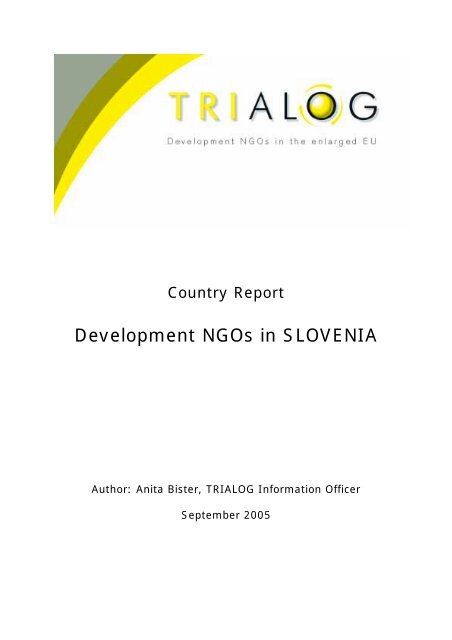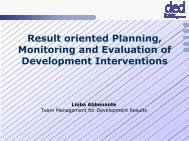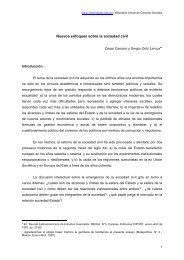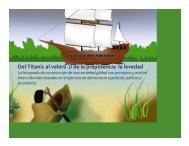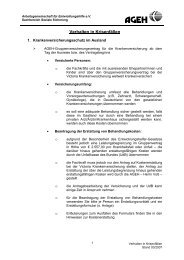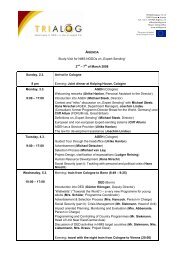TRIALOG country report: Development NGOs in Slovenia
TRIALOG country report: Development NGOs in Slovenia
TRIALOG country report: Development NGOs in Slovenia
Create successful ePaper yourself
Turn your PDF publications into a flip-book with our unique Google optimized e-Paper software.
Country Report<br />
<strong>Development</strong> <strong>NGOs</strong> <strong>in</strong> SLOVENIA<br />
Author: Anita Bister, <strong>TRIALOG</strong> Information Officer<br />
September 2005
Table of Content<br />
Introduction ...........................................................3<br />
Fields of activities of NGDOs.....................................3<br />
<strong>Development</strong> education and awareness rais<strong>in</strong>g activities .............. 5<br />
Countries of operation.................................................................. 6<br />
NGDO network<strong>in</strong>g/Process of platform establishment ..6<br />
Sources of fund<strong>in</strong>g ..................................................7<br />
<strong>Slovenia</strong>n sources ........................................................................ 8<br />
European Union Sources .............................................................. 8<br />
NGO – Government Cooperation ...............................8<br />
The <strong>in</strong>stitutional and political framework ...................................... 8<br />
The NGDO dialogue with the government ................................... 10<br />
Bibliography ......................................................... 11<br />
Country Report SLOVENIA page 2
Introduction 1<br />
Both, on the state ODA level as well as on the level of NGDO network<strong>in</strong>g,<br />
<strong>Slovenia</strong> is still very much <strong>in</strong> the process of sett<strong>in</strong>g up structures and procedures<br />
for cooperation <strong>in</strong> the field of <strong>in</strong>ternational development. In comparison to other<br />
Central European new member states (H, SK, CZ, PL), <strong>Slovenia</strong> has a much less<br />
developed ODA system and NGDO sector.<br />
Accord<strong>in</strong>g to estimates, there are about 40 <strong>NGOs</strong> that are active <strong>in</strong> development<br />
cooperation or expressed their <strong>in</strong>terest <strong>in</strong> be<strong>in</strong>g <strong>in</strong>volved <strong>in</strong> this sphere <strong>in</strong> future.<br />
Among this group, about 15 <strong>NGOs</strong> have been participat<strong>in</strong>g <strong>in</strong> recent events which<br />
aimed at establish<strong>in</strong>g a <strong>Slovenia</strong>n NGDO platform and strengthen<strong>in</strong>g the dialogue<br />
between the NGDOs and the <strong>Slovenia</strong>n MFA. In general, there is a lack of overall<br />
<strong>in</strong>formation on the NGDO sector and on the number and projects of <strong>Slovenia</strong>n<br />
NGDOs which makes it difficult to analyse the capacity of the sector. At present,<br />
many <strong>in</strong>dividual <strong>NGOs</strong> are small and weak and lack <strong>in</strong>formation about each<br />
other’s activities. 2<br />
In the area of development cooperation <strong>Slovenia</strong>n NGDOs are compet<strong>in</strong>g with<br />
strong governmental and <strong>in</strong>tergovernmental organisations which implement the<br />
vast majority of <strong>Slovenia</strong>’s ODA programmes. These are <strong>in</strong>stitutions such as<br />
UNICEF, the International Trust Fund for Dem<strong>in</strong><strong>in</strong>g and M<strong>in</strong>e Victims Assistance<br />
(ITF), the Foundation Together or the Centre of Excellence <strong>in</strong> F<strong>in</strong>ance. 3<br />
It can be mentioned that trade unions play a larger role <strong>in</strong> public life <strong>in</strong> <strong>Slovenia</strong><br />
than <strong>in</strong> other new member states. There are examples where they are <strong>in</strong>volved<br />
<strong>in</strong> activities which can be related to <strong>in</strong>ternational development. Together with<br />
partners from Germany, Sweden and Belgium, the Association of Free Trade<br />
Unions (ZSSS) conducts tra<strong>in</strong><strong>in</strong>g activities for trade unions from South Eastern<br />
Europe and is <strong>in</strong>volved <strong>in</strong> development education activities among its members<br />
around the topic of economic globalization. 4<br />
Fields of activities of NGDOs<br />
Although the <strong>Slovenia</strong>n NGDO sector might look not much consolidated and very<br />
fragmented at first glance, the <strong>Slovenia</strong>n NGDOs have a lot of experience <strong>in</strong><br />
certa<strong>in</strong> work<strong>in</strong>g fields. One of the focuses are children’s rights, other priorities<br />
are social care and health care, especially psychosocial well-be<strong>in</strong>g of children,<br />
mental health, work with refugees, voluntary work, <strong>in</strong>tercultural work, youth<br />
work, Roma projects, humanitarian aid or work aga<strong>in</strong>st traffick<strong>in</strong>g <strong>in</strong> human<br />
be<strong>in</strong>gs. A lot of groups of people carried out small humanitarian projects <strong>in</strong> the<br />
areas of conflict <strong>in</strong> former Yugoslavia, e.g. <strong>in</strong> Bosnia and Herzegov<strong>in</strong>a.<br />
1 Special thanks to Gorana Flaker from SEECRAN for her time and the <strong>in</strong>formation given <strong>in</strong> an <strong>in</strong>terview.<br />
2 Interview with Gorana Flaker (SEECRAN), 1.2.2005<br />
3 Cf. http://www.gov.si/mzz/eng/m<strong>in</strong>istry/office_for_<strong>in</strong>t_coop_hum_ass.html [8.11.2004]<br />
4 Seewald, Magda with Andrlik, Erich: <strong>Development</strong> Co-operation and NGDOs <strong>in</strong> <strong>Slovenia</strong>, Survey/Vienna<br />
Institute for <strong>Development</strong> and Cooperation (VIDC), September 2004, 15.<br />
Country Report SLOVENIA page 3
A few small <strong>NGOs</strong> are more and more becom<strong>in</strong>g <strong>in</strong>volved <strong>in</strong> development<br />
cooperation. The network organisation SEECRAN – South East European Child<br />
Rights Action Network took the lead <strong>in</strong> promot<strong>in</strong>g the establishment of a<br />
<strong>Slovenia</strong>n NGDO platform (see chapter: NGDO Network<strong>in</strong>g/Process of platform<br />
establishment). The network comprises non-governmental organisations,<br />
agencies, <strong>in</strong>stitutions and <strong>in</strong>dividuals promot<strong>in</strong>g the UN Convention on the Rights<br />
of the Child <strong>in</strong> the South-East European region. The organisation HUMANITAS<br />
conducts child sponsorship programmes – not only for socially unprivileged<br />
children <strong>in</strong> <strong>Slovenia</strong> but also <strong>in</strong> some African countries. Together with the<br />
environmental organisation UMANOTERA and the <strong>Slovenia</strong>n Ethnographic<br />
Museum, HUMANITAS has set up Fair Trade activities. The first Fair Trade shop<br />
has been opened <strong>in</strong> Ljubljana on 10 December 2004, the <strong>in</strong>ternational day of<br />
human rights. Most of the products are imported from the Austrian fair trade<br />
organization EZA. Some products come from eight direct producers primarily<br />
from Burk<strong>in</strong>a Faso, Kenya and Nepal. Some very specific <strong>NGOs</strong> are engaged <strong>in</strong><br />
projects abroad as well, e.g. the organisation EKVILIB which promotes sports as<br />
tool for <strong>in</strong>ternational understand<strong>in</strong>g.<br />
Volunteer<strong>in</strong>g is a wide spread phenomenon with<strong>in</strong> <strong>Slovenia</strong>. About 80<br />
organisations offer<strong>in</strong>g volunteer positions are listed <strong>in</strong> a volunteer guide<br />
published by the “Association for development of preventive and voluntary<br />
work”. 5 However, <strong>in</strong>ternational volunteer send<strong>in</strong>g is not quite developed yet.<br />
There is the <strong>Slovenia</strong>n branch of Service Civil International which is called<br />
Voluntariat - SCI <strong>Slovenia</strong>. Apart from organis<strong>in</strong>g voluntary work, <strong>in</strong>ternational<br />
work camps and tra<strong>in</strong><strong>in</strong>gs <strong>in</strong> <strong>Slovenia</strong>, the organisation undertakes <strong>in</strong>ternational<br />
exchange of volunteers and supports other organisations <strong>in</strong> implement<strong>in</strong>g<br />
projects of voluntary work. Voluntariat cooperates with more than 50<br />
organisations cover<strong>in</strong>g Europe, Asia, Australia and North America. 6 But it has no<br />
special focus on develop<strong>in</strong>g countries at present. 7 There is another very small<br />
organisation called “Help for Tibet” which on a volunteer basis provides some<br />
assistance to Tibet. 8<br />
Three Catholic church related organisations are active <strong>in</strong> humanitarian aid and<br />
missionary work. The <strong>Slovenia</strong>n Caritas carries out about 10% of its activities<br />
abroad. Although the focus is on humanitarian aid, the organisation is plann<strong>in</strong>g<br />
to move towards a more long term oriented development approach. The<br />
Missionary Center and the closely related association of lay missionaries LAMIS<br />
send <strong>Slovenia</strong>n priests and volunteers to several countries <strong>in</strong> Africa, Oceania,<br />
South America and Asia. Lay missionaries undergo a two years preparation<br />
period before they are deployed for a m<strong>in</strong>imum of one to three years. At the<br />
moment, 8 lay missionaries and about 100 missionary priests and nuns work <strong>in</strong><br />
the field. They are <strong>in</strong>volved <strong>in</strong> various educational, social and health projects as<br />
well as <strong>in</strong> technical assistance programmes (road construction etc.). Apart from<br />
this, LAMIS is organis<strong>in</strong>g short term “missionary camps” dur<strong>in</strong>g summer. In<br />
2005, these camps were supposed to take place <strong>in</strong> Côte d'Ivoire, Madagaskar,<br />
India and Jamaica. 9 The Missionary Center also implements child sponsorship<br />
5 Mali vodnik prostovoljnega dela, izdalo: Drustvo za razvijanje preventivnega <strong>in</strong> prostovoljnega dela, Ljubljana<br />
2002.<br />
6 http://www.zavod-voluntariat.si/ [9.2.2005]<br />
7 Seewald, Magda with Andrlik, Erich: <strong>Development</strong> Co-operation and NGDOs <strong>in</strong> <strong>Slovenia</strong>, Survey/Vienna<br />
Institute for <strong>Development</strong> and Cooperation (VIDC), September 2004, 22.<br />
8 Interview with Gorana Flaker (SEECRAN), 1.2.2005<br />
9 Handout “Zbornik prispevkov” at the workshop “Involvement of <strong>Slovenia</strong>n NGO <strong>in</strong> the programmes of<br />
development and humanitarian aid”, 14.-15.10.2004, Ljubljana.<br />
Country Report SLOVENIA page 4
programmes and similar to other countries, it has carried out the Carol s<strong>in</strong>gers’<br />
campaign s<strong>in</strong>ce 1994/95. 10<br />
Among the humanitarian organisations, the <strong>Slovenia</strong>n section of the Red Cross<br />
has to be mentioned. However, their ma<strong>in</strong> programmes are carried out <strong>in</strong><br />
<strong>Slovenia</strong> 11 , whereas on the <strong>in</strong>ternational arena they act via their headquarters <strong>in</strong><br />
Geneva.<br />
Some <strong>Slovenia</strong>n organisations have a more research or service focus. For<br />
example, the Peace Institute is ma<strong>in</strong>ly a policy research NGO, which was<br />
established through grants from the Open Society <strong>in</strong>stitute. The Legal<br />
Information Centre for <strong>NGOs</strong> – PIC is an non-governmental organisation<br />
established <strong>in</strong> 1997 by the Peace Institute, Amnesty International <strong>Slovenia</strong>, the<br />
Association for <strong>Development</strong> of Preventive and Voluntary Work, the Regional<br />
Centre for Environment for Central and Eastern Europe – REC <strong>Slovenia</strong> and<br />
ALCEDO. It aims at contribut<strong>in</strong>g to improve the situation of nongovernmental<br />
organisations <strong>in</strong> <strong>Slovenia</strong> and offers legal counsell<strong>in</strong>g and tra<strong>in</strong><strong>in</strong>gs for <strong>NGOs</strong>. 12<br />
Some <strong>NGOs</strong> currently deal<strong>in</strong>g with the revitalisation and development of the<br />
<strong>country</strong>side (e.g. Vitra – Center for Susta<strong>in</strong>able <strong>Development</strong>, Nas Laz – Rural<br />
<strong>Development</strong> Office) or <strong>NGOs</strong> from the social field want to extend their activities<br />
to other countries <strong>in</strong> future. Accord<strong>in</strong>g to Gorana Flaker from SEECRAN, a<br />
number of organisations deal<strong>in</strong>g with consumer rights, mentally ill people,<br />
disabled people, drug addicted people or children without parental care would<br />
have great potential for work<strong>in</strong>g abroad as well. 13<br />
As the description of the sector shows, except for the missionary send<strong>in</strong>g<br />
organisations, there are no <strong>NGOs</strong> that have a predom<strong>in</strong>ant development focus.<br />
Even two years ago, <strong>NGOs</strong> were not aware that some of their activities could be<br />
classified as development cooperation activities. They were not us<strong>in</strong>g the term<br />
“development cooperation”. 14 However, the comb<strong>in</strong>ation of experience <strong>in</strong> the own<br />
<strong>country</strong> and the gradual <strong>in</strong>crease of activities abroad together with the good<br />
knowledge of South-Eastern Europe might provide a good basis for more future<br />
<strong>in</strong>volvement <strong>in</strong> this field.<br />
<strong>Development</strong> education and awareness rais<strong>in</strong>g activities<br />
Apart from s<strong>in</strong>gle awareness rais<strong>in</strong>g and fundrais<strong>in</strong>g activities from <strong>in</strong>dividual<br />
<strong>NGOs</strong>, there was no broad campaign on development issues tak<strong>in</strong>g place <strong>in</strong><br />
<strong>Slovenia</strong> so far. This results <strong>in</strong> a lack of public awareness <strong>in</strong> this field. Smaller<br />
<strong>NGOs</strong> f<strong>in</strong>d it hard to develop media relations. It is mostly <strong>in</strong>ternational and<br />
church based organisations that can afford bigger campaigns or own<br />
publications.<br />
Among the educational <strong>in</strong>stitutions, the Faculty of Social Work of Ljubljana<br />
University can be mentioned as supportive of NGDO activities. The Faculty is<br />
very often cooperat<strong>in</strong>g with NGDOs and is itself <strong>in</strong>volved <strong>in</strong> <strong>in</strong>ternational<br />
10 http://www.rkc.si/misijoni/tri_kraljevska/trikraljevska.htm [8.2.2005]<br />
11 http://tux.kabi.si/fast/rks/<strong>in</strong>dex.php?mod=page&cid=134&id=359 [9.2.2005]<br />
12 http://www.pic.si/en/<strong>in</strong>fo/PIC_presentation.pdf [8.2.2005]<br />
13 Interview with Gorana Flaker (SEECRAN), 1.2.2005<br />
14 Interview with Gorana Flaker (SEECRAN), 1.2.2005<br />
Country Report SLOVENIA page 5
network<strong>in</strong>g with educational <strong>in</strong>stitutions from the South Eastern European region.<br />
Other universities are offer<strong>in</strong>g study places for students from abroad, especially<br />
from former YU and Albania. 15<br />
Countries of operation<br />
Most <strong>NGOs</strong> work <strong>in</strong> South Eastern Europe, ma<strong>in</strong>ly <strong>in</strong> the countries of former<br />
Yugoslavia. This holds true e.g. for the Association for development of preventive<br />
and voluntary work, SEECRAN (<strong>in</strong>cludes members from Albania, Bosnia and<br />
Herzegov<strong>in</strong>a, Bulgaria, Croatia, Greece, Hungary, Kosovo, Macedonia,<br />
Montenegro, Romania, Serbia, <strong>Slovenia</strong> and Turkey), the <strong>Slovenia</strong>n antitraffick<strong>in</strong>g<br />
NGO “Kljuc” and many others. Apart from the focus on Albania,<br />
Serbia, Bosnia and Herzegov<strong>in</strong>a, the <strong>Slovenia</strong>n Caritas has had activities also <strong>in</strong><br />
Kongo and Sudan. Through the <strong>in</strong>ternational Caritas network, the organisation<br />
has supported projects <strong>in</strong> other countries, e.g. <strong>in</strong> Iraq. Via Voluntariat - SCI<br />
about 50 <strong>Slovenia</strong>n volunteers per year are deployed <strong>in</strong> projects <strong>in</strong> develop<strong>in</strong>g<br />
countries. 16<br />
Lay missionaries work <strong>in</strong> Kongo, Madagaskar, Angola, Côte d'Ivoire and Papua<br />
New Gu<strong>in</strong>ea, clerical missionaries are located <strong>in</strong> Albania and Russia (Sibiria), the<br />
Middle East (Izrael, Libanon, Turkey), <strong>in</strong> the Far East (India, Hong Kong,<br />
Thailand, Taiwan, Japan), Central Asia (Kirgizistan) and <strong>in</strong> Africa (Angola, Ben<strong>in</strong>,<br />
Ruanda, Kongo, Burundi, Botswana, Tanzania, South Africa, Madagascar). The<br />
child sponsorship programme of the Missionary Center is applied <strong>in</strong> Zambia,<br />
Kongo, Angola, Malawi and <strong>in</strong> Bolivia, Paraguay and Brasil. 17 HUMANITAS carries<br />
out its child sponsorship programmes <strong>in</strong> Kenya, Ghana and Burk<strong>in</strong>a Faso.<br />
NGDO network<strong>in</strong>g/Process of platform establishment<br />
In general, network<strong>in</strong>g between NGDOs <strong>in</strong> <strong>Slovenia</strong> is very low. There is little<br />
exchange of <strong>in</strong>formation and experience between the <strong>Slovenia</strong>n NGDOs as well<br />
as little <strong>in</strong>volvement <strong>in</strong> <strong>in</strong>ternational development cooperation or humanitarian<br />
aid programmes (except for the <strong>NGOs</strong> that are part of an <strong>in</strong>ternational NGO<br />
network). Some <strong>NGOs</strong> are well <strong>in</strong>terl<strong>in</strong>ked <strong>in</strong> their specific work<strong>in</strong>g field.<br />
In the past few years, there have been a few attempts to establish a network of<br />
development and humanitarian <strong>NGOs</strong>. However they did not result <strong>in</strong> the formal<br />
establishment of an NGDO platform yet.<br />
The Centre for <strong>in</strong>formation service, co-operation and development of <strong>NGOs</strong> -<br />
CNVOS which was founded <strong>in</strong> 2001 was meant to act as an <strong>in</strong>terface between<br />
<strong>NGOs</strong> and the <strong>Slovenia</strong>n government. 18 Because of its found<strong>in</strong>g history, with the<br />
government be<strong>in</strong>g significantly <strong>in</strong>volved, the NGO network CNVOS (despite its<br />
120 member organisations by July 2004) is met with low confidence from the<br />
15 Interview with Gorana Flaker (SEECRAN), 1.2.2005<br />
16 Handout “Zbornik prispevkov” at the workshop “Involvement of <strong>Slovenia</strong>n NGO <strong>in</strong> the programmes of<br />
development and humanitarian aid”, 14.-15.10.2004, Ljubljana.<br />
17 http://www.rkc.si/misijoni/ [9.2.2005]<br />
18 http://www.freedomhouse.org/research/nitransit/2004/slovenia2004.pdf [8.2.2005]<br />
Country Report SLOVENIA page 6
NGO side. 19 It is not regarded as a forum which could take over the role of a<br />
platform specifically cover<strong>in</strong>g the needs of development and humanitarian aid<br />
<strong>NGOs</strong>.<br />
In 2004, Gorana Flaker from SEECRAN took aga<strong>in</strong> the <strong>in</strong>itiative of establish<strong>in</strong>g a<br />
<strong>Slovenia</strong>n NGDO platform. An <strong>in</strong>itiative group consist<strong>in</strong>g of 10 organisations<br />
(SEECRAN, CNVOS, Umanotera, Humanitas, Missionary Center, PIC, Voluntariat,<br />
Vitra, Peace Institute and the Faculty of Social Work of Ljubljana University 20 )<br />
took the responsibility to organise a Consultation for <strong>NGOs</strong> and government<br />
officials on the topic “Involvement of <strong>Slovenia</strong>n NGO <strong>in</strong> the programmes of<br />
development and humanitarian aid”. The meet<strong>in</strong>g took place <strong>in</strong> October 2004<br />
with the participation of both government officials and about 40 NGO<br />
representatives. The programme <strong>in</strong>cluded presentations of the Slovak and<br />
Austrian NGDO platforms, the Canadian ODACE programme and a presentation<br />
on NGDO cooperation with the European Commission done by <strong>TRIALOG</strong>. The<br />
meet<strong>in</strong>g was a major step <strong>in</strong> the direction of a platform establishment <strong>in</strong><br />
<strong>Slovenia</strong>. After the October event some further <strong>NGOs</strong> (e.g. <strong>Slovenia</strong>n Caritas)<br />
jo<strong>in</strong>ed the process. The “<strong>in</strong>formal platform” has established work<strong>in</strong>g groups on<br />
the dialogue with the government as well as on the topic of public awareness<br />
rais<strong>in</strong>g <strong>in</strong> development issues. The process of platform establishment entered <strong>in</strong><br />
another decisive phase <strong>in</strong> February 2005 when two <strong>in</strong>teractive NGO workshops<br />
dealt <strong>in</strong> detail with the mission and mandate of the platform and the legal and<br />
organisational steps necessary to officially establish it with<strong>in</strong> the upcom<strong>in</strong>g<br />
months. 21 From November 2004 until March 2005, the ODACE programme has<br />
supported these activities by pay<strong>in</strong>g a share of 30% of a full time position <strong>in</strong> the<br />
SEECRAN office. The legal registration of the SLOGA platform, which stands for<br />
“<strong>Slovenia</strong>n Global Action Platform”, is now envisaged for autumn this year. The<br />
organisations most actively <strong>in</strong>volved <strong>in</strong> this process are SEECRAN, CNVOS,<br />
Humanitas, Ekvilib, <strong>Slovenia</strong>n Caritas and PIC. 22<br />
F<strong>in</strong>d the website of the <strong>Slovenia</strong>n SLOGA platform at:<br />
http://www.sloga-platform.org<br />
Sources of fund<strong>in</strong>g<br />
<strong>Slovenia</strong>n development <strong>NGOs</strong> very much rely on sources from foreign donors,<br />
governments (e.g. Netherlands, USA) and <strong>in</strong>ternational <strong>NGOs</strong>. The Soros<br />
Foundation left the <strong>country</strong> about 3 years ago which is much earlier than<br />
compared to other new EU member states where the foundation reduced<br />
activities only after the EU entry. 23 Especially smaller <strong>Slovenia</strong>n <strong>NGOs</strong> (1-5<br />
employees) lack susta<strong>in</strong>able fund<strong>in</strong>g and capacity to ga<strong>in</strong> f<strong>in</strong>ancial strength<br />
(often derived from lack of human resources or lack of expert knowledge on<br />
fundrais<strong>in</strong>g). 24<br />
19 Seewald, Magda with Andrlik, Erich: <strong>Development</strong> Co-operation and NGDOs <strong>in</strong> <strong>Slovenia</strong>, Survey/Vienna<br />
Institute for <strong>Development</strong> and Cooperation (VIDC), September 2004, 6-7.<br />
20 Izjava za medije ob zakljucku posveta “Vkljucevanje slovenskih NVO v programme razvojne <strong>in</strong> humanitarne<br />
pomoci”, Republika Slovenija, M<strong>in</strong>istrstvo za zunanje zadeve, Sektor za mednarodno razvojno sodelovanje <strong>in</strong><br />
humanitarno pomoc. Oktober 2004.<br />
21 Interview with Gorana Flaker (SEECRAN), 1.2.2005<br />
22 Cf. SLOGA, Zabelezka z delovnega sestanka z dne 15.09.2005, prepared by Sasa Mlakar, SEECRAN.<br />
23 Interview with Gorana Flaker (SEECRAN), 1.2.2005<br />
24 Information given by Darja Baric, former employee of VOLUNTARIAT, email from 15.2.2005.<br />
Country Report SLOVENIA page 7
<strong>Slovenia</strong>n sources<br />
S<strong>in</strong>ce till now the <strong>Slovenia</strong>n ODA system is lack<strong>in</strong>g a real political concept and<br />
framework (see chapter: NGO – Government Cooperation), there is no<br />
transparent NGDO co-f<strong>in</strong>anc<strong>in</strong>g system <strong>in</strong> place <strong>in</strong> <strong>Slovenia</strong>. <strong>NGOs</strong> received some<br />
fund<strong>in</strong>g from various m<strong>in</strong>istries and many of them successfully approached local<br />
state authorities for smaller project fund<strong>in</strong>g. However, due to the cutt<strong>in</strong>g down of<br />
state expenses <strong>in</strong> the past few years, <strong>NGOs</strong> faced reduced public fund<strong>in</strong>g 25 .<br />
Alternative private sources of fund<strong>in</strong>g are limited although “self-f<strong>in</strong>anc<strong>in</strong>g”<br />
(through membership/participation fees) and generat<strong>in</strong>g private donations and<br />
contributions are used methods. Private fundrais<strong>in</strong>g is used especially by the<br />
church <strong>in</strong>stitutions (missionaries, Caritas) as well as <strong>in</strong>ternational <strong>NGOs</strong> (e.g. Red<br />
Cross) or <strong>in</strong>ternational organisations (e.g. UNICEF). They were most capable of<br />
rais<strong>in</strong>g respectable private funds. For example, the Carol S<strong>in</strong>gers’ campaign<br />
raised 29m SIT (approx. 130.000,- EUR) for projects <strong>in</strong> Madagaskar, Bolivia,<br />
Brazil and other countries. 26 Recently, the child sponsorship programmes were<br />
also able to attract private donations.<br />
Private companies, especially local enterprises tend to provide funds for small<br />
scale NGO projects, e.g. <strong>in</strong> Bosnia and Herzegov<strong>in</strong>a. 27 Private foundations are not<br />
developed <strong>in</strong> <strong>Slovenia</strong>. This miss<strong>in</strong>g <strong>in</strong>terest <strong>in</strong> a substantial <strong>in</strong>vestment <strong>in</strong> such<br />
activities goes hand <strong>in</strong> hand with a non-stimulat<strong>in</strong>g legal environment <strong>in</strong> terms of<br />
tax reduction for sponsor<strong>in</strong>g and donations by the private sector. 28<br />
European Union Sources<br />
Many <strong>Slovenia</strong>n <strong>NGOs</strong> made use of funds from the PHARE programme or e.g.<br />
from European Union’s youth programmes. Concern<strong>in</strong>g the participation <strong>in</strong> the<br />
2004 Calls with<strong>in</strong> the 21 02 03 budget l<strong>in</strong>e for actions <strong>in</strong> develop<strong>in</strong>g countries<br />
(PVD) and development education activities (ED), no survey has been made<br />
among <strong>Slovenia</strong>n <strong>NGOs</strong>. It can be assumed that hardly any <strong>Slovenia</strong>n NGO was<br />
submitt<strong>in</strong>g a proposal to EuropeAid and that there are most likely no PVD or ED<br />
applications where a <strong>Slovenia</strong>n NGO would be the lead agency. However, the<br />
<strong>NGOs</strong> Humanitas and Umanotera submitted a proposal as partner <strong>in</strong> ED together<br />
with other European development <strong>NGOs</strong>.<br />
NGO – Government Cooperation<br />
The <strong>in</strong>stitutional and political framework<br />
With<strong>in</strong> the <strong>Slovenia</strong>n M<strong>in</strong>istry of Foreign Affairs (MFA), the “Office for<br />
International Cooperation and Humanitarian Assistance” which has been set up <strong>in</strong><br />
25 Information given by Darja Baric, former employee of VOLUNTARIAT, email from 15.2.2005.<br />
26 <strong>Slovenia</strong>, ODA and the ODACE Programme. CIDA-ODACE Work<strong>in</strong>g Paper, prepared by Adam Novak, with<br />
additional material from <strong>TRIALOG</strong>, May 2004.<br />
27 Interview with Gorana Flaker (SEECRAN), 1.2.2005<br />
28 Information given by Darja Baric, former employee of VOLUNTARIAT, email from 15.2.2005.<br />
Country Report SLOVENIA page 8
2002 is responsible to coord<strong>in</strong>ate <strong>Slovenia</strong>’s ODA activities. 29 It was def<strong>in</strong>ed as<br />
ma<strong>in</strong> function of the office to “ensure <strong>Slovenia</strong>’s <strong>in</strong>ternational assistance follows<br />
its political priorities and is fully transparent and systematically carried out and<br />
recorded” 30 . However, by August 2005, no official ODA statistics on <strong>Slovenia</strong>’s<br />
(past and future) ODA spend<strong>in</strong>gs has been officially available. Accord<strong>in</strong>g to the<br />
website of the MFA, both <strong>in</strong> 2000 and 2001 <strong>Slovenia</strong>n ODA amounted to<br />
approximately 5000m SIT 31 (approx. 22m EUR). The ODA level between 2000<br />
and 2002 was represent<strong>in</strong>g about 0,02% of GDP. 32 Accord<strong>in</strong>g to estimates, 20%<br />
were contributions to the UN and other multilateral mechanisms, 20% were<br />
channelled through the Stability Pact for South Eastern Europe, the rema<strong>in</strong><strong>in</strong>g<br />
60% were spent for bilateral projects. 33 Accord<strong>in</strong>g to scientific sources, ODA <strong>in</strong><br />
2003 amounted to 25m USD or 0,1% of GDP. 34 S<strong>in</strong>ce the EU entry, 4,86% of<br />
new member states’ contributions to the EU budget are recorded as ODA. This<br />
might br<strong>in</strong>g <strong>Slovenia</strong>’s ODA spend<strong>in</strong>g up to 0,12-0,14%. 35<br />
There is no overall official strategy paper on <strong>Slovenia</strong>’s development assistance.<br />
Neither the government nor the parliament have elaborated a respective<br />
framework. The M<strong>in</strong>istry of F<strong>in</strong>ance, which together with the M<strong>in</strong>istry of Economy<br />
and the M<strong>in</strong>istry of Agriculture accounts for a big part of <strong>Slovenia</strong>n ODA, has<br />
produced a strategy paper for its own development programme and has<br />
proposed a general policy framework which is under discussion between the<br />
different <strong>in</strong>volved l<strong>in</strong>e m<strong>in</strong>istries. 36 The MFA controls only a m<strong>in</strong>or part of<br />
<strong>Slovenia</strong>n ODA. 37<br />
As mentioned above, <strong>Slovenia</strong> is implement<strong>in</strong>g development activities and<br />
projects primarily through the mechanism of the Stability Pact for South Eastern<br />
Europe 38 . This means a clear de facto focus on the war-torn countries of former<br />
Yugoslavia and on <strong>Slovenia</strong>’s transitional experience. Apart from this focus on the<br />
Western Balkan countries, Moldova and the Ukra<strong>in</strong>e are treated as priority<br />
countries. 39 <strong>Slovenia</strong> also contributed to the rehabilitation of Afghanistan and<br />
sent aid to some places of humanitarian disasters. 40 Develop<strong>in</strong>g countries of the<br />
Mediterranean and Central Asia are def<strong>in</strong>ed as target areas <strong>in</strong> the programme<br />
paper of the M<strong>in</strong>istry of F<strong>in</strong>ance as well. 41<br />
29 http://www.gov.si/mzz/eng/m<strong>in</strong>istry/office_for_<strong>in</strong>t_coop_hum_ass.html [8.11.2004]<br />
30 http://www.gov.si/mzz/eng/foreign_poli/<strong>in</strong>ternational_development.html [8.11.2004]<br />
31 http://www.gov.si/mzz/eng/foreign_poli/<strong>in</strong>ternational_development.html [8.11.2004]<br />
32 Krichewsky, Lena: <strong>Development</strong> Policy <strong>in</strong> the Accession Countries; <strong>TRIALOG</strong> study, 2 2003, 30.<br />
http://www.trialog.or.at/docs/study-march03.pdf [8.2.2005].<br />
33 <strong>Slovenia</strong>, ODA and the ODACE Programme. CIDA-ODACE Work<strong>in</strong>g Paper, prepared by Adam Novak, with<br />
additional material from <strong>TRIALOG</strong>, May 2004.<br />
34 Quoted <strong>in</strong>: Seewald, Magda with Andrlik, Erich: <strong>Development</strong> Co-operation and NGDOs <strong>in</strong> <strong>Slovenia</strong>,<br />
Survey/Vienna Institute for <strong>Development</strong> and Cooperation (VIDC), September 2004, 10.<br />
35 Novak, Adam: NGDO Partnerships <strong>in</strong> the enlarged EU. Presentation at the Sem<strong>in</strong>ar on “EC <strong>Development</strong> Cooperation:<br />
Policy, Instruments & Fund<strong>in</strong>g” <strong>in</strong> Riga, 29 August 2005;<br />
http://www.trialog.or.at/docs/lv_ngdo_partnership_<strong>in</strong>_the_enlarged_eu.pdf [20.9.2005]<br />
36 Seewald, Magda with Andrlik, Erich: <strong>Development</strong> Co-operation and NGDOs <strong>in</strong> <strong>Slovenia</strong>, Survey/Vienna<br />
Institute for <strong>Development</strong> and Cooperation (VIDC), September 2004, 10.<br />
37 Novak, Adam: NGDO Partnerships <strong>in</strong> the enlarged EU. Presentation at the Sem<strong>in</strong>ar on “EC <strong>Development</strong> Cooperation:<br />
Policy, Instruments & Fund<strong>in</strong>g” <strong>in</strong> Riga, 29 August 2005;<br />
http://www.trialog.or.at/docs/lv_ngdo_partnership_<strong>in</strong>_the_enlarged_eu.pdf [20.9.2005]<br />
38 http://www.gov.si/mzz/eng/foreign_poli/<strong>in</strong>ternational_development.html [8.11.2004]<br />
39 Seewald, Magda with Andrlik, Erich: <strong>Development</strong> Co-operation and NGDOs <strong>in</strong> <strong>Slovenia</strong>, Survey/Vienna<br />
Institute for <strong>Development</strong> and Cooperation (VIDC), September 2004, 10.<br />
40 http://www.gov.si/mzz/eng/foreign_poli/<strong>in</strong>ternational_development.html [8.11.2004]<br />
41 <strong>Development</strong> cooperation programme of the M<strong>in</strong>istry of F<strong>in</strong>ance of the Republic of <strong>Slovenia</strong>, prepared by<br />
Gasper Jez, April 2004.<br />
Country Report SLOVENIA page 9
Among the sectoral priorities are the reconstruction of <strong>in</strong>frastructure, rebuild<strong>in</strong>g<br />
of devastated and destroyed <strong>in</strong>stitutional build<strong>in</strong>gs, assistance <strong>in</strong> reestablishment<br />
of governmental services, the establishment of market economy, care for<br />
refugees, dem<strong>in</strong><strong>in</strong>g and capacity build<strong>in</strong>g <strong>in</strong> democratization. <strong>Slovenia</strong> recognizes<br />
the Millennium <strong>Development</strong> Goals as ma<strong>in</strong> ODA objective. 42<br />
F<strong>in</strong>d the website of the <strong>Slovenia</strong>n MFA at:<br />
http://www.gov.si/mzz/eng/foreign_poli/<strong>in</strong>ternational_development.html<br />
The NGDO dialogue with the government<br />
After the October 2004 consultation between NGDOs and the government, the<br />
<strong>Slovenia</strong>n MFA issued a press release welcom<strong>in</strong>g the <strong>in</strong>itiative of the NGDOs for<br />
the establishment of a platform and for becom<strong>in</strong>g a recognised partner for the<br />
dialogue with the government. 43 The October meet<strong>in</strong>g contributed a lot to the<br />
confidence build<strong>in</strong>g between NGDOs and the MFA. In general, the MFA is will<strong>in</strong>g<br />
to cooperate with <strong>NGOs</strong> and understands the necessity of sett<strong>in</strong>g up a<br />
transparent policy and catch<strong>in</strong>g up with <strong>in</strong>ternational ODA standards.<br />
However, the <strong>NGOs</strong> would welcome more cooperation with – and fund<strong>in</strong>g from –<br />
the state. In January 2005, the <strong>in</strong>formal platform work<strong>in</strong>g group on relations with<br />
the MFA def<strong>in</strong>ed the follow<strong>in</strong>g three priority issues for the dialogue with the<br />
government: the def<strong>in</strong>ition of a cont<strong>in</strong>uous dialogue and regular meet<strong>in</strong>g<br />
schedule, the adm<strong>in</strong>istrative and f<strong>in</strong>ancial support of the MFA for the platform,<br />
the role of the platform <strong>in</strong> the process of sett<strong>in</strong>g up an ODA strategy for<br />
<strong>Slovenia</strong>. 44 Because of an ODA system which is devided among several<br />
m<strong>in</strong>istries, <strong>NGOs</strong> f<strong>in</strong>d it hard to cooperate with the government. The lack of<br />
transparency and of clear responsibilities on the governmental side, make it<br />
difficult for <strong>NGOs</strong> to lobby their <strong>in</strong>terests. However, the establishment of a<br />
platform and of a function<strong>in</strong>g NGDO network might contribute to improve the<br />
relations and to put external pressure on the government <strong>in</strong> order to establish<br />
needed ODA mechanisms.<br />
42 http://www.gov.si/mzz/eng/foreign_poli/<strong>in</strong>ternational_development.html [8.11.2004]<br />
43 Izjava za medije ob zakljucku posveta “Vkljucevanje slovenskih NVO v programme razvojne <strong>in</strong> humanitarne<br />
pomoci”, Republika Slovenija, M<strong>in</strong>istrstvo za zunanje zadeve, Sektor za mednarodno razvojno sodelovanje <strong>in</strong><br />
humanitarno pomoc. Oktober 2004.<br />
44 Interview with Gorana Flaker (SEECRAN), 1.2.2005<br />
Country Report SLOVENIA page 10
Bibliography<br />
<strong>Development</strong> cooperation programme of the M<strong>in</strong>istry of F<strong>in</strong>ance of the Republic<br />
of <strong>Slovenia</strong>, prepared by Gasper Jez, April 2004.<br />
Krichewsky, Lena: <strong>Development</strong> Policy <strong>in</strong> the Accession Countries; <strong>TRIALOG</strong><br />
study, 2 2003, 30. http://www.trialog.or.at/docs/study-march03.pdf [8.2.2005].<br />
Mali vodnik prostovoljnega dela, izdalo: Drustvo za razvijanje preventivnega <strong>in</strong><br />
prostovoljnega dela, Ljubljana 2002.<br />
Novak, Adam: NGDO Partnerships <strong>in</strong> the enlarged EU. Presentation at the<br />
Sem<strong>in</strong>ar on “EC <strong>Development</strong> Co-operation: Policy, Instruments & Fund<strong>in</strong>g” <strong>in</strong><br />
Riga, 29 August 2005;<br />
http://www.trialog.or.at/docs/lv_ngdo_partnership_<strong>in</strong>_the_enlarged_eu.pdf<br />
[20.9.2005]<br />
Seewald, Magda with Andrlik, Erich: <strong>Development</strong> Co-operation and NGDOs <strong>in</strong><br />
<strong>Slovenia</strong>, Survey/Vienna Institute for <strong>Development</strong> and Cooperation (VIDC),<br />
September 2004.<br />
<strong>Slovenia</strong>, ODA and the ODACE Programme. CIDA-ODACE Work<strong>in</strong>g Paper,<br />
prepared by Adam Novak, with additional material from <strong>TRIALOG</strong>, May 2004.<br />
Interview<br />
Gorana Flaker (SEECRAN), 1.2.2005.<br />
Websites [date of download]<br />
http://tux.kabi.si/fast/rks/<strong>in</strong>dex.php?mod=page&cid=134&id=359 [9.2.2005]<br />
http://www.freedomhouse.org/research/nitransit/2004/slovenia2004.pdf<br />
[8.2.2005]<br />
http://www.gov.si/mzz/eng/foreign_poli/<strong>in</strong>ternational_development.html<br />
[8.11.2004]<br />
http://www.gov.si/mzz/eng/m<strong>in</strong>istry/office_for_<strong>in</strong>t_coop_hum_ass.html<br />
[8.11.2004]<br />
http://www.pic.si/en/<strong>in</strong>fo/PIC_presentation.pdf [8.2.2005]<br />
http://www.rkc.si/misijoni/ [9.2.2005]<br />
http://www.rkc.si/misijoni/tri_kraljevska/trikraljevska.htm [8.2.2005]<br />
http://www.zavod-voluntariat.si/ [9.2.2005]<br />
Other sources<br />
Handout “Zbornik prispevkov” at the workshop “Involvement of <strong>Slovenia</strong>n NGO<br />
<strong>in</strong> the programmes of development and humanitarian aid”, 14.-15.10.2004,<br />
Ljubljana.<br />
Country Report SLOVENIA page 11
Information given by Darja Baric, former employee of VOLUNTARIAT, email from<br />
15.2.2005.<br />
Izjava za medije ob zakljucku posveta “Vkljucevanje slovenskih NVO v<br />
programme razvojne <strong>in</strong> humanitarne pomoci”, Republika Slovenija, M<strong>in</strong>istrstvo za<br />
zunanje zadeve, Sektor za mednarodno razvojno sodelovanje <strong>in</strong> humanitarno<br />
pomoc. Oktober 2004.<br />
SLOGA, Zabelezka z delovnega sestanka z dne 15.09.2005, prepared by Sasa<br />
Mlakar, SEECRAN.<br />
We welcome comments, corrections or amendments to our Country<br />
Report on <strong>Development</strong> <strong>NGOs</strong> <strong>in</strong> <strong>Slovenia</strong>. Please write to<br />
a.bister@trialog.or.at<br />
Vienna Head Office<br />
Wohllebengasse 12-14 ■ 1040 Vienna Austria ■ Tel. +43 1 319 79 49 -0 ■ Fax -15<br />
office@trialog.or.at ■ http://www.trialog.or.at<br />
Brussels Lobby Office<br />
10 Square Ambiorix ■ Brussels 1000 Belgium ■ Tel. +32-2-743 87 78, +32-486-977437<br />
Fax: +32-2-732 19 34 ■ trialog@concordeurope.org ■ http://www.trialog.or.at<br />
This document has been produced with the f<strong>in</strong>ancial assistance of the European Union. The<br />
contents of this document are the sole responsibility of <strong>TRIALOG</strong> and can under<br />
no circumstances be regarded as reflect<strong>in</strong>g the position of the European Union.<br />
Country Report SLOVENIA page 12


